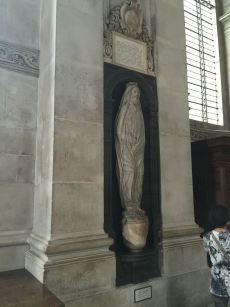
Batter my heart, three-person'd God, for you
As yet but knock, breathe, shine, and seek to mend;
That I may rise and stand, o'erthrow me, and bend
Your force to break, blow, burn, and make me new.
I, like an usurp'd town to another due,
Labor to admit you, but oh, to no end;
Reason, your viceroy in me, me should defend,
But is captiv'd, and proves weak or untrue.
Yet dearly I love you, and would be lov'd fain,
But am betroth'd unto your enemy;
Divorce me, untie or break that knot again,
Take me to you, imprison me, for I,
Except you enthrall me, never shall be free,
Nor ever chaste, except you ravish me.
John Donne is arguably the most famous member of the metaphysical poets, a loosely connected group of poets from the 1600s whose works often meditated upon the subjects of love and religion. Holy Sonnet 14, as you can probably guess by the name, was written as part of a series of poems collectively known as the Holy Sonnets all of which focus upon religious ideas, religious life and the divine. Of the nineteen sonnets in the collection, Holy Sonnet 14 is arguably one of the more controversial ones since it suggests that the author has a sadomasochistic relationship with God. “three-person’d God” is a reference to the Holy Trinity in Christianity (the Father, the Son and the Holy Spirit) and the fact that Donne is therefore asking God to “Batter” his heart could be considered quite shocking, if taken literally.
However, what Donne is actually doing is introducing a conceit, a form of extended metaphor, in the first line of the poem, using physically violent imagery so as to symbolise the violence of his spiritual struggle with all three parts of God. This is made clear in the fourth line of the sonnet in which he says he wants God to “break, blow, burn and make me new” – suggesting that this inner battle is bringing about a renewal within Donne, a reference to Christian theology and the idea that through God’s intervention, through the sacrifice of Jesus Christ on the cross, we as human beings are redeemed, washed clean from our wrongdoings. What is interesting is that he decides to portray this positive process in such an aggressive manner. Perhaps Donne is implicitly arguing that the journey to redemption supposed to be a difficult one – he knows that he must undergo hardship so as to realise his shortcomings and thus become a better person, more like God.
He then employs the language of marriage so as to depict his struggle against the devil, saying “[I] am betroth’d unto your enemy/ divorce me, untie or break that knot again”. His metaphorical engagement to the devil is perhaps representative of Donne’s (and mankind’s) weakness to give into temptation and so he has to call upon God to break his tie to “the enemy” so that he may live instead in his light. He then finishes the poem with another potentially controversial line, which suggests that God ravishes him. Again, however, this line (which ends the conceit - of violent imagery - started on the first line of the poem) should not be taken too literally – though Donne has deliberately used a double entendre so as to be ambiguous and shock his readers. The word ravish can also mean “to be filled with joy”. Donne, by putting this at the end of the poem, is therefore suggesting that his relationship with God ultimately brings him great happiness.
Image: By 'Shakespearesmonkey' (Flickr) [CC BY 2.0 (http://creativecommons.org/licenses/by/2.0)], via Wikimedia Commons

0 Comment:
Be the first one to comment on this article.